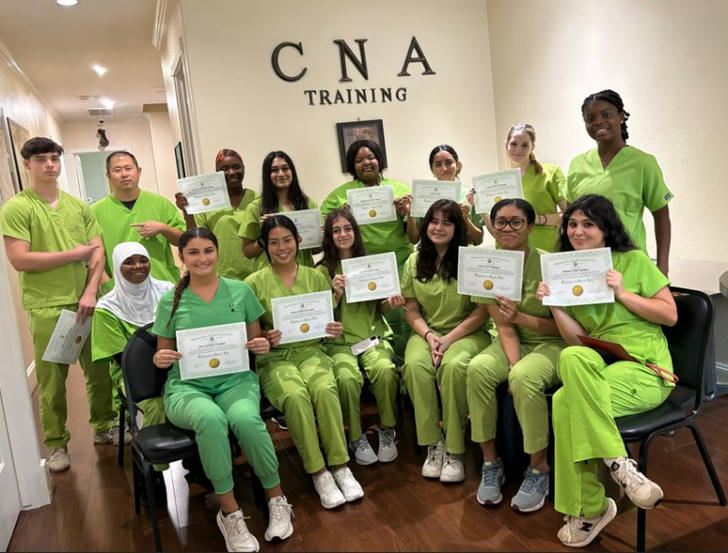Become a Certified Nursing Assistant: A Detailed Guide to CNA Courses and Certification Steps
Becoming a Certified Nursing Assistant (CNA) is one of the quickest paths into the healthcare field. Whether you are a recent high school graduate or someone looking to switch careers, CNA courses offer a fast and efficient way to enter the nursing industry. In this article, we'll walk you through the key steps involved in becoming a CNA, including the course content, certification process, job prospects, and salary expectations. Let's get started!

1. What is a CNA, and Why Should You Become One?
CNA's Core Responsibilities
A Certified Nursing Assistant (CNA) plays a crucial role in patient care within hospitals, nursing homes, and other healthcare settings. The key responsibilities of a CNA include:
Basic Patient Care: Helping patients with daily activities like bathing, dressing, eating, and using the restroom.
Monitoring Vital Signs: Taking and recording patients’ vital signs, such as blood pressure, temperature, pulse, and respiration rate.
Assisting with Treatment: Assisting nurses and doctors with basic medical tasks such as administering medications and changing dressings.
Providing Emotional Support: Offering comfort and emotional support to patients, which can help reduce anxiety and make them feel more comfortable.
Why Choose to Become a CNA?
Fast Entry into the Healthcare Field: CNA courses typically take just 6 to 12 weeks to complete, allowing you to start your career in healthcare quickly.
High Demand: With an aging population, the need for CNAs in long-term care facilities, home care, and hospitals is growing, making it a reliable career choice.
Stability and Career Growth: The CNA role provides job stability and opportunities for advancement. Many CNAs continue their education to become Licensed Practical Nurses (LPNs) or Registered Nurses (RNs).
2. CNA Course Structure and Curriculum
What You Will Learn in a CNA Course
A CNA program prepares students with the necessary skills and knowledge to take care of patients in various settings. Here’s an overview of the core content:
Basic Nursing Skills: You will learn how to assist patients with daily living activities, like bathing, dressing, eating, and toileting.
Vital Sign Monitoring: Training includes how to accurately measure and record vital signs, including blood pressure, temperature, pulse, and respiration.
First Aid and Emergency Procedures: The course includes essential first aid techniques, such as CPR (Cardiopulmonary Resuscitation), wound care, and handling emergencies.
Patient Care and Comfort: You will also learn how to provide emotional and psychological support to patients, helping them cope with illness or injury.
Health and Safety: Safety protocols, including how to lift and move patients safely, as well as infection control procedures, are also covered.
Program Length and Delivery Methods
CNA courses generally last between 6 and 12 weeks and include both classroom learning and hands-on clinical experience. Here are your options for how to complete the course:
In-person Courses: Traditional in-person courses are ideal for students who prefer structured learning and face-to-face interaction with instructors. They often offer more direct, hands-on practice in real healthcare settings.
Online Courses: Many institutions now offer online CNA programs, which allow students to learn at their own pace. Online learning is flexible, making it a great option for people who have work or family commitments. However, online courses still require students to complete a certain amount of in-person clinical training.
Clinical Internship
As part of your CNA training, you will need to complete a clinical internship. This is your opportunity to apply what you’ve learned in a real healthcare setting under the supervision of experienced professionals. This hands-on experience is crucial in helping you build confidence and skill.
3. CNA Certification Process

Step 1: Choose an Accredited CNA Program
To become a CNA, you must complete an accredited CNA program. Make sure the program is approved by your state's nursing board, as each state has specific requirements for CNA certification. Some reputable options include:
Red Cross: Offers nationally recognized CNA training programs.
Community Colleges: Many community colleges provide CNA courses that also offer clinical experience.
Online Platforms: Websites like Coursera and edX provide flexible online CNA courses for students who need a more adaptable schedule.
Step 2: Complete the Program and Pass the Exam
Once you finish your coursework, you’ll need to pass the CNA certification exam. The exam typically consists of two parts:
Written Exam: The written exam tests your knowledge of basic nursing, patient care, safety protocols, and other essential topics.
Practical Exam: The practical exam requires you to demonstrate your CNA skills, such as taking vital signs or providing personal care to a patient, under the supervision of an examiner.
Most schools offer review materials and practice exams to help you prepare for this important test.
Step 3: Apply for Certification
After passing your exams, you can apply for certification with your state’s nursing board. The process usually requires submitting an application, providing proof of your educational background, undergoing a background check, and passing a health screening.
Step 4: Start Job Hunting
Once certified, you can start looking for CNA jobs. You can work in hospitals, nursing homes, home care agencies, or even private practices. Most schools also offer job placement assistance or connect students with local employers through job fairs or partnerships.
4. CNA Job Outlook and Salary Expectations
Job Outlook
The demand for CNAs is expected to grow rapidly. According to the U.S. Bureau of Labor Statistics (BLS), the employment of nursing assistants is projected to grow by 9% from 2020 to 2030, much faster than the average for other occupations. The aging baby boomer population is driving demand for healthcare services, especially in long-term care and home healthcare, where CNAs are in high demand.
Salary Expectations
CNA salaries can vary depending on the state, city, and type of healthcare setting. On average, CNAs earn between $25,000 and $35,000 per year. In some areas with higher living costs or greater demand, CNAs can earn more, while those in smaller or rural areas might earn less. Many employers also offer benefits such as health insurance, paid time off, and retirement plans.
5. Online vs. Traditional CNA Courses
Advantages of Online Courses
Flexibility: Online programs let you set your own pace and schedule, making them ideal for people with jobs or family commitments.
Lower Costs: Online courses are often more affordable than traditional in-person programs, as they don’t require commuting or paying for classroom space.
Convenience: You can study from the comfort of your own home, and many online programs allow you to access course materials whenever you need them.
Advantages of In-person Courses
Direct Interaction: In-person courses provide opportunities to engage with instructors and fellow students in real time, which can make learning easier and more interactive.
Hands-on Practice: Traditional programs typically provide more in-depth hands-on practice, allowing you to work directly with patients under professional supervision.
6. The Advantages and Challenges of Becoming a CNA

Advantages
Quick Entry: CNA certification is one of the fastest ways to enter the healthcare field, with courses often taking just a few months to complete.
High Demand: As the population ages, the need for CNAs continues to grow, offering a stable career with plenty of opportunities.
Job Stability: Healthcare jobs, especially those for CNAs, are in high demand, and the need for these professionals will continue for many years.
Challenges
Self-discipline: Online courses require strong time-management skills since you will need to keep track of your learning schedule.
Physical and Emotional Demands: Working as a CNA can be physically demanding, as you may need to assist patients with mobility. Additionally, the job can be emotionally challenging, especially when working with terminally ill or elderly patients.
Conclusion
Becoming a Certified Nursing Assistant (CNA) is a rewarding career path that offers quick entry into the healthcare industry and a wide range of job opportunities. With strong job demand, competitive salaries, and the chance to make a real difference in people's lives, becoming a CNA could be the perfect fit for you.
If you're ready to take the next step, choose a CNA program that works for you—whether it's in-person or online—and start your journey to a fulfilling healthcare career today!
